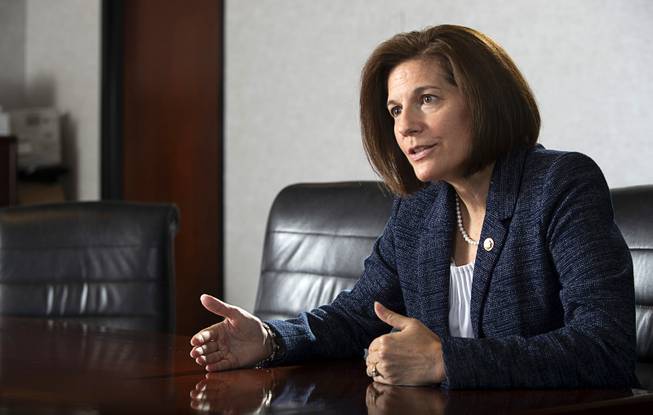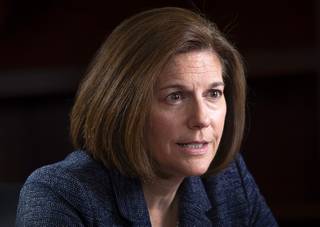
Sen. Catherine Cortez Masto, D-NV, responds to a question during an editorial board meeting at the Las Vegas Sun office in Henderson Tuesday, Oct. 8, 2019.
Sunday, Oct. 13, 2019 | 2 a.m.
Sen. Catherine Cortez Masto has some questions — the Nevada Democrat, former prosecutor and state attorney general says President Donald Trump’s recent actions have raised concerns that justify the House’s impeachment inquiry.
Cortez Masto said that getting to the truth of the events around the president’s July 25 with Ukrainian President Volodymyr Zelenskiy was necessary to understand whether Trump put his personal interests in his 2020 re-election campaign over the country’s security interests.
In a recent interview with the Sun, Cortez Masto outlined her concerns with the president’s actions, the issues she wants to see tackled by the Senate and her frustration with the legislative standstill in Congress’ upper chamber.
Could you detail what your concerns are regarding the impeachment inquiry?
The concerns that I have are a couple of things. This president putting his interests ahead of our national security interests and the potential for abuse of power there, at least what I have seen with the summary of the telephone call. No president should be reaching out to a foreign country or a president of a foreign country and asking them to investigate a political rival. So I do support the investigation.
Could you explain the national security implications of all of this?
You have a brand-new president, Zelenskiy, who comes looking to get support from the United States, an ally, and important support in the protection of the Ukrainians in their independence. Part of that support comes with military aid and aid in general that Congress has appropriated.
I want to know of the aid that we appropriated in Congress, why was the president holding back? Why is the president even holding back on a meeting?
President Zelenskiy made it very clear he wanted a meeting with the president in the White House. You even saw it in the press conference. Before all of this broke, there was a press conference. If you remember, Zelenskiy made a joke about it — he said, “Well, you know, the president invited me to meet with him but he still hasn’t given me the date.” I think all of that is wrapped up in this pattern here of my concern that the president had put pressure on President Zelenskiy to investigate Joe Biden because there’s a political race going on. I think that’s why the inquiry is important.
As a former prosecutor and attorney general, it all starts with that investigation, it starts with the facts, uncovering what was going on. Was there a pattern? Who else had conversations? I think it’s important for us to uncover that, and that’s why not only do I support it, but what I’m seeing is a number of Americans support it as well, and rightfully so, to uncover the truth.
What’s your reaction to the White House ignoring subpoenas or not making its people available in the inquiry?
If you think the telephone call was perfect, if the president thinks it’s perfect and if he thinks that he didn’t do anything wrong, then why is he pushing back on making himself or anyone else available to talk about the facts and what happened there?
It looks like the prospect is pretty dim of seeing any kind of meaningful steps forward on higher education policies coming out of Congress. Do you share that assessment?
Whatever the House has passed is not going anywhere in the Senate. It is a legislative graveyard because Senate Majority Leader Mitch McConnell (R-Ky.) has made it that way. That has been my frustration for the last three years now that I’ve been in the Senate. There’s been no debates on important legislation that matters to this country and all Americans.
We should be on the floor debating health care and how we bring access to affordable health care to millions of Americans. We should be debating on women’s reproductive freedom and rights. We should be debating common sense gun safety measures. I mean, 90% of Americans support universal background checks. We did it here in Nevada and we can’t even debate that on the floor of the Senate. The institution of the Senate is supposed to be this great deliberative body where everybody comes together, debates issues, introduces amendments, and then compromises and looks to pass good legislation.
That is not happening at all, and it’s time for us to get back to that, and that’s why I’ve taken on the role of the Democratic Senatorial Campaign Committee chair to flip the Senate.
The punditry would say you’ve got a steep uphill climb there. How are you feeling about the next round of Senate elections?
I think just the opposite. We actually have several states where either Hillary Clinton won in 2016 or we did really well in 2018. The states that are on the map for us are Arizona, Colorado, North Carolina, Iowa and Maine. We’ve got Georgia with the two seats now. Potentially Kansas depending on how that plays out. We’ve got great candidates who are going to be on the offense in Texas, in Kentucky and in South Carolina.
There have been multiple bills related to Yucca Mountain introduced recently. One, led by Republican Sen. Lisa Murkowski of Alaska, would create a consent-based process for nuclear waste storage but would not grandfather in Yucca Mountain. How are discussions going on this bill?
As we talk about nuclear waste and spent nuclear fuel, we all recognize we have to do something. My goal is to make sure others recognize that every state should be treated equally, and that means Nevada as well. The legislation that (fellow Nevadan) Sen. Jacky Rosen and I reintroduced — that’s really the focus. Those are the conversations we are having.
There is some legislation in Energy and Natural Resources where we’re starting to have a conversation about what to do in our future when it comes to nuclear power, but also the waste. We want to be part of the solution and dialogue, but we want to be treated like everyone else.
Sen. Murkowski has said she’s open to having those conversations.
What’s next for the SAFE Banking Act, which would let cannabis companies use the banking system?
There’s bipartisan support for it on the Senate side. I sit on Banking, Housing and Urban Affairs. We’ve had an initial hearing on this issue. Sen. Mike Crapo (R-Idaho) is the chairman, and Sen. Sherrod Brown (D-Ohio) is the ranking member. I have talked to Sen. Crapo and I have heard him say publicly that he is open to exploring and having more hearings on the SAFE Banking Act and if there’s a pathway forward.
I think it makes complete sense that we allow those states like Nevada that have chosen to legalize medicinal or recreational marijuana to be able to safely bank with a financial institution. I think for purposes of these cash businesses, there’s always concerns about money laundering or criminal activity going on. It alleviates that type of concern if we allow them, like any other small business, to bank. The law will also respect those states that choose not to go down that path, and that’s the goal here.
Technology and connectivity issues, especially in rural areas, have been one of your emphasis points. Has that been a bipartisan issue?
It has been. What I have worked on is ensuring we’re bringing broadband not just to our rural communities but to our underserved areas in our urban communities. It comes down to connectivity is key. We know, and I know, particularly on the ground here, that when you bring that connectivity, you’re bringing and opening the door to services that they lack.
That is part of this discussion. My biggest concern is this — we are a country, rightfully so, moving into a time when our technology is exponentially growing. We’re also talking about going from 4G to 5G. 5G is going to open the door to the interconnectivity of things. It’s going to open the door to smart communities, smart homes, all of that.
We’ve been asking you a lot of questions. Is there anything you would like to tell us?
I’m very proud of where we are in Nevada, and where we’ve come from. From the downturned economy to the economy that we have now. My goal is to continue to make sure it’s robust, and we are growing and diversifying our revenue base here.
We have all this tech manufacturing. My goal is, not only ensure through my legislation that we are continuing to embrace that technology from drones to electric vehicles and buses to smart communities to the infrastructure that’s necessary like electric charging stations. I was just in Panaca — there’s a charging station there for electric vehicles. The goal is to make sure the infrastructure is there as we continue down the path of supporting it.
Could you detail some examples about how you’re tackling this?
One of the pieces of legislation that I was able to get passed was to continue to allow us to be a drone-testing state. A number of other issues along with that too, not only grow the testing but make sure we have a kind of air-traffic management system for that. The legislation that I had was to ensure we were investing at that workforce, working with our community colleges to make sure there’s the curriculum so that we’re training on this new technology.
I have a whole package of legislation that’s focused on electric vehicles — investing in our charging stations, investing in our infrastructure, tax credits for local communities that want to continue down that path.
We have led the country in solar, and we have created jobs. It has contributed billions of dollars to our economy. I have legislation I’m working on now to extend the solar tax credits so that we can continue to support solar in this state and across the country. It has the added benefit of helping us reduce our carbon footprint and address climate change.
In Nevada, I don’t have to tell all of you, we’ve seen wildfires, we’ve seen the drought. People don’t realize, rangeland fires are the majority of the fires we see, not forest fires. Most of the (federal) money goes to the forest firefighting, not the rangeland fires.
What we have seen in Northern Nevada is, when you’re devastated by these fires, it’s not necessarily infrastructure like houses. It is really the land for the small businesses — the farmers and the ranchers.
In the past when we’ve had these rangeland and wildfires, we actually had no funding for it. The Forest Service and Bureau of Land Management would take money out of their existing budget to fight all of this, so that always kept them behind. Last Congress we actually funded a separate pot of money to fight wildfires so they wouldn’t have to rob Peter to pay Paul. That kicks in in 2020.

